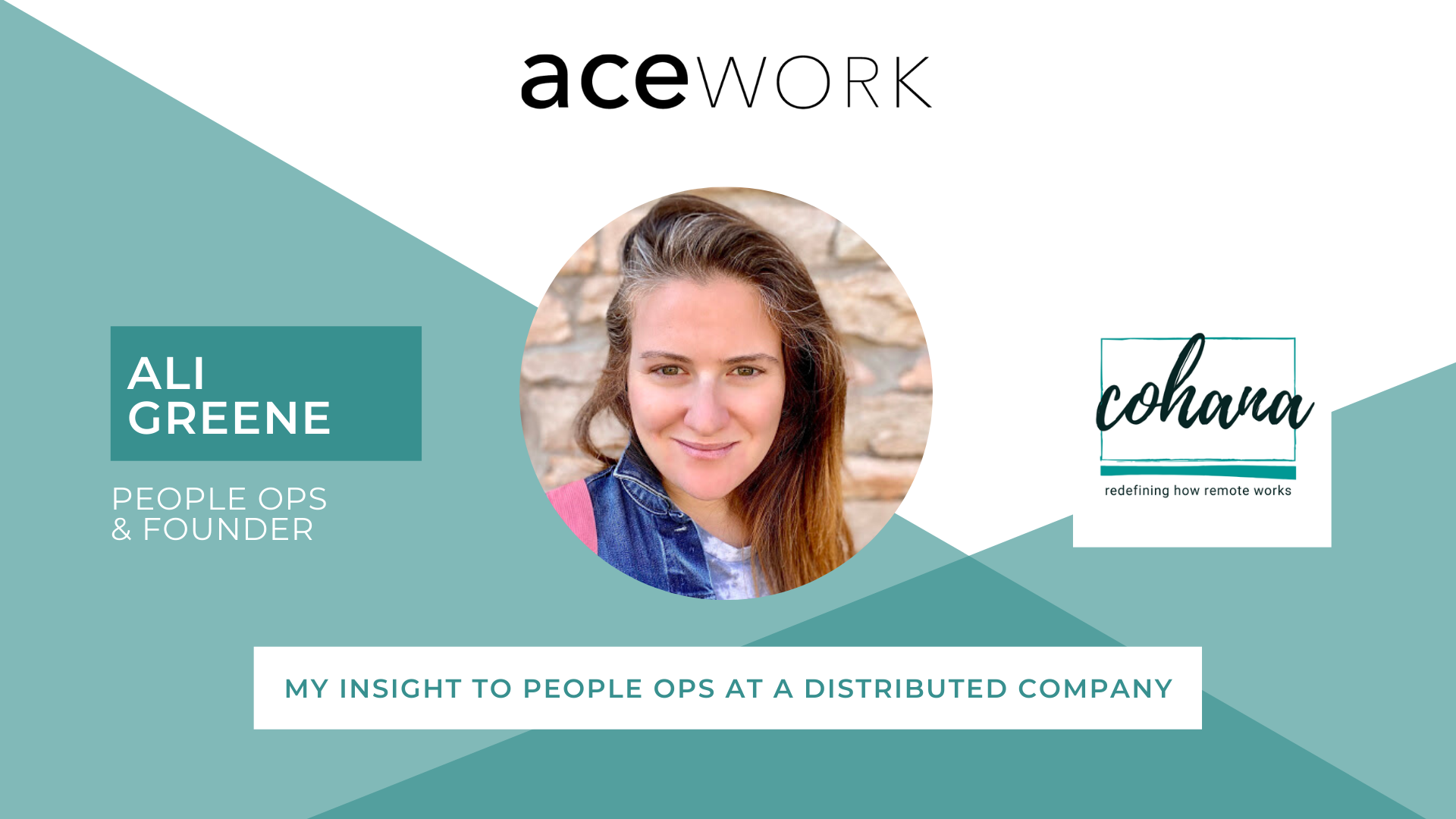People Operations may not be the first remote job that comes to mind. Yet they are the glue that keeps remote teams together. To deliver their best at work, employees must first be happy and content in the workplace regardless if it’s online or not. We spoke to Ali Greene, former Director of People Operations at DuckDuckGo, and a true expert in building successful remote companies. In her new venture Cohana, Ali collaborates with leaders in remote, or remote-curious companies, on developing the People Operations strategy roadmap so leaders can then focus their headcount or hiring budgets.
What is your goal as People Ops?
I believe the goal of a People Ops team should be to make sure employees are:
- Effective,
- Efficient,
- Engaged at work.
Having a People team involved with company strategy at the leadership level focused on the employee experience and behavioural norms at work, ensures decisions are being made that are mutually beneficial for both the company and the individual.
Compared to People Ops at an office, what challenges have you encountered when dealing with remote employees?
One of the biggest challenges is not being able to see if people are struggling. It is easy to hide behind a computer screen or pretend things are going okay when speaking asynchronously. This especially true at the moment. People are managing anxieties and fears around COVID19 differently and being personally impacted in various ways.
The lesson here is two-fold, one as a People Ops professional ensuring managers in your organization is set up with the skills. They need to identify when someone needs support, build strong relationships, and lead with vulnerability-based trust.
As a People Ops person, it is important to make an effort to get to know people in the organization remotely. This means having visibility by designing and participating in remote team-building. Being a part of the community helps people remember to use you as a resource. It also removes some of the stigmas of the “out-of-touch HR person” that sometimes is present in people’s minds (Yes, I can’t believe that stereotype still exists either!).
What setbacks have you come across and how did you/or your team overcome them?
One of the biggest lessons I learned is in my last role. Leading and developing a People Ops team from just me to five people in about four years is to not overestimate your abilities ‘do it all’ from day one.
People Operations Teams are responsible for many facets of an organization. In order to have the time to build relationships remotely and act with intentionality; it is important to have enough bandwidth to be proactive. This includes creating cultural norms, systems and processes for things like hiring, professional development. Not just focusing on the necessary or urgent tasks in the organization.
I would recommend for People Ops teams to work on the necessary tasks in increments. Iterating on them instead of waiting for it to be “complete” before working on proactive tasks. Done does not exist. Things are always evolving this ensures you are prioritizing both the needs and the wants for the organization.
What additional tasks do you have in your remote people ops role (as opposed to an on-site one)?
Planning a variety of meetups and retreats for team members to collaborate. Thinking about strategies to connect people virtually and creating momentum in the participation of such programs. From onboarding new employees to appreciation and celebration of milestones, to simple team-building.
While it is important to experiment and find what works for your organization. I have seen success across the board with the “Donut Buddy” model. This offers opportunities for interest-based employee groups, and of course those face-to-face opportunities.
Describe the administrative and compliance-related challenges you encountered, and how you are dealing with them.
Hands down the biggest challenge is compliance-related employment laws. The fact that they differ state to state, and country to country. Also, some administrative needs simply do not make sense for the remote environment. The requirements have not caught up. An example that is top of mind is workplace safety – what does that look like without a physical workplace?
The best way to manage that from my perspective is to make decisions from the most considerate legal perspective. However, it should also align with your company’s values. This ensures not only the strictest policies are met but also that employees feel appreciated.
Describe any processes that helped streamline the employee experience.
Consistent expectations per team and role on communication and project work. This reduces the mental overhead to reinvent the wheel each time you are working with someone new. As well as on a new task and allows people to focus on the work and each other. Having clear expectations reduces friction and frustration in communication. This can look like a checklist for each person to follow when communicating or a list of questions to answer when embarking on a new work venture internally.
Clear processes around feedback, professional development (i.e. promotions), and sharing company-wide objectives also helps employees align themselves with the company mission and see their path forward in developing a career within an organization.
What are some of the must-have skills that People Ops in remote companies must possess?
Building trust, empathetic communication, informal influence, self-awareness, and effective self-management, to name a few ?
At acework, we support businesses in building successful distributed workforces with tailored remote advisory programs. The program enables teams by building custom remote strategies for companies based on their culture, processes and business needs. Schedule a free strategy session to know more about remote advisory.
If you’re looking to hire top vetted remote talent, Register your company and start hiring here.






